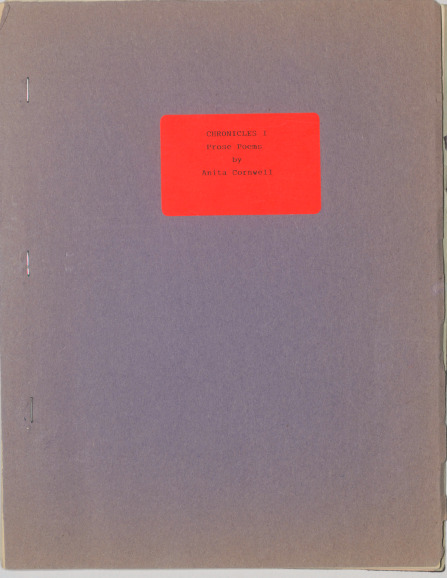-
Title
-
Chronicles I, Prose Poems by Anita Cromwell
-
Description
-
Anita Cornwell (1923 - 2023). Ms Cornwell’s “Chronicles 1, Prose Poems in 1986” is captured in digital form. The document opens with a dedication to Cornwell’s mother and a short biography highlighting her career as a writer and playwright, followed by the table of contents that lists five poems.
They are:
1. First Love and Other Traumas
2. Second Coming
3. Sordid Mansions
4. In Praise of the Foremothers
5. Remembrance of Sister-Love
-
It begins with the prose poem “First Love and Other Traumas,” a meditation on an early, passionate relationship that was both exhilarating and devastating. It unfolds in sections interweaving themes of love/loss, survival, oppression and resilience. The beloved is remembered as a fierce, untamed presence whose absence leaves the narrator struggling to survive amid personal grief and a broader world of turmoil. The poem weaves together intimate loss with imagery of war, occupation, and social collapse, suggesting that private love and public struggle are deeply intertwined. The narrator refuses to accept rumors of the beloved’s disappearance or death, clinging instead to memory and the symbolic torch of resistance. Alongside this, a recurring figure—the magpie—appears as a voice of cynicism, mocking the narrator’s persistence and urging resignation or escape into pleasure. Yet the narrator resists despair, insisting on holding together the fragile connective tissue of community and justice. It ends with a reflection on time, change, and the abyss left by the beloved’s absence, framing love as both a source of revolutionary energy and an irreparable wound. In other words, the ending reinforces the narrator’s resistance. Even in silence, they refuse to let their grief or love be absorbed into the magpie’s fatalism.
In “Remembrance of Sister-Love,” the narrator recalls a woman she calls the Baby Bandit — a vibrant, chaotic spirit whose laughter could hold off even Death for a moment. The Baby Bandit defied authority, mocked the self-importance of men, and insisted on living for herself rather than conforming to society’s rules. The narrator, both wary and captivated, followed her up life’s “treacherous mountain.” When the Baby Bandit dies, a church congregation tries to sanctify her memory with hymns and empty ritual, but the narrator rebels, condemning their hypocrisy and hurling hymn books at the deacons. Instead of submission to mourning conventions, the narrator clings to the Baby Bandit’s irreverent laughter, carrying it beyond the “blighted temple” into the freedom of sunlight.
In these two pieces of Cornwell’s work, the magpie and the Baby Bandit embody opposing forces that shape the narrator’s world. The magpie is cynicism given voice — urging surrender, mocking hope, and echoing the oppressive systems that demand compliance. The Baby Bandit, by contrast, is rebellion made flesh — laughing in the face of death, scorning patriarchal power, and insisting on joy and self-determination. Together they represent the inner and outer struggle of marginalized women: to give in to despair or to seize life defiantly. Cornwell’s narrator ultimately aligns with the Baby Bandit’s legacy, carrying her laughter forward as a torch of survival and resistance.
-
Contributor
-
John J. Wilcox, Jr. Archives at William Way LGBT Community Center
-
Date Created
-
1986
-
Creator
-
Cornwell, Anita
-
Rights
-
http://rightsstatements.org/vocab/InC/1.0/
-
Identifier
-
Ms. Coll. 127
-
Language
-
eng
-
Format
-
Text
-
Extent
-
34 pages
-
Spatial Coverage
-
Philadelphia, PA
-
Publisher
-
Sojourner Truth Press
-
Is Part Of
-
Anita Cornwell personal and literary papers, 1949-2009
-
Subject
-
Prose poems, American
-
Poets, American
-
Playwriting
-
Lesbians
-
African American women
-
Patriarchy in literature


